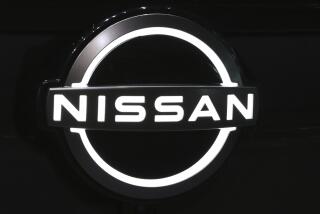Air Bags: A Hot Issue Again
- Share via
Automobile air bags are credited with saving 1,600 lives over the last decade, but in a grim demonstration of the law of unintended consequences these passive safety devices may also have fatally injured scores of people. At least 20 adults, most of them small or elderly, and 31 children have been killed by the impact of the bags, which deploy at up to 200 m.p.h. in even low-speed collisions. Federal regulators have now proposed some important new steps to reduce the danger.
Air bags, almost all of which are activated only by front-end collisions, are mandatory on all new cars on both the driver and passenger sides of the front seat. As the vehicle population equipped with them increases, so will the potential harm they can do. The automobile industry has been well ahead of the government in calling attention to the problem and has urged that their explosive power be reduced.
The National Highway Traffic Safety Administration has now ordered that new cars carry prominent warnings that the bags can kill children. At the same time the agency emphasizes that children who ride in the back seat and are properly wearing seat belts are unlikely to be seriously injured in a front-end crash. The agency will also ask for public comment on a number of other proposed steps. One is to “depower” air bags by up to 35%, lessening their impact. It further proposes to allow car owners to give informed consent to deactivate the bags. The traffic safety administration is also looking at new technologies that can maintain the safety features of air bags while lessening their risks.
Making it legal to disconnect air bags could be expected to raise demands for making their installation in new cars optional, which could save buyers who didn’t want them hundreds of dollars. That in turn would raise anew issues about insurance and liability. It has been assumed for many years that the debate over air bags was settled. But as the government prepares to modify its requirements it appears that the argument may in fact be far from over.






